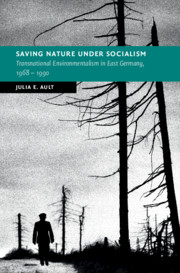Book contents
- Saving Nature Under Socialism
- New Studies in European History
- Saving Nature Under Socialism
- Copyright page
- Dedication
- Contents
- Figures
- Acknowledgments
- Abbreviations
- Introduction
- Chapter 1 Balancing Economy and Ecology: Building toward Environmental Protection, 1945–1970
- Chapter 2 “Socialist Environmentalism”: Between Ideal and Practice, 1971–1982
- Chapter 3 Church, Faith, and Nature: An Alternative Environmentalism, 1972–1983
- Chapter 4 Intertwining Environmentalisms: Transboundary Pollution and Protest in Central Europe
- Chapter 5 Coming Out From Behind the Cloud: Environmentalism after Chernobyl
- Chapter 6 Growing Together? The Environment in the Collapse of Communism
- Conclusion
- Bibliography
- Index
Introduction
Published online by Cambridge University Press: 30 August 2021
- Saving Nature Under Socialism
- New Studies in European History
- Saving Nature Under Socialism
- Copyright page
- Dedication
- Contents
- Figures
- Acknowledgments
- Abbreviations
- Introduction
- Chapter 1 Balancing Economy and Ecology: Building toward Environmental Protection, 1945–1970
- Chapter 2 “Socialist Environmentalism”: Between Ideal and Practice, 1971–1982
- Chapter 3 Church, Faith, and Nature: An Alternative Environmentalism, 1972–1983
- Chapter 4 Intertwining Environmentalisms: Transboundary Pollution and Protest in Central Europe
- Chapter 5 Coming Out From Behind the Cloud: Environmentalism after Chernobyl
- Chapter 6 Growing Together? The Environment in the Collapse of Communism
- Conclusion
- Bibliography
- Index
Summary
When Monika Maron published Flight of Ashes in 1981, she shocked readers with stark images of Bitterfeld, one of Europe’s most polluted cities in the heart of the East German Chemical Triangle. Considered the first book about environmental degradation in East Germany (German Democratic Republic, GDR), Maron had to publish the novel abroad in West Germany (Federal Republic of Germany, FRG). The pollution exposed the environmental devastation of Soviet-style economies: “And these fumes could serve as road signs. Please go straight ahead to the ammonia, then turn left at the nitric acid. When you feel a stabbing pain in your throat and bronchial tubes, turn around and call a doctor, that was sulfur dioxide.”1 Maron’s work not only graphically portrays the pollution but also illustrates the GDR’s unique position between eastern and western Europe during the Cold War. A West German press published the novel for a West German audience, revealing the conditions in Bitterfeld as well as conveying the uncomfortable feeling of constant secret police, or Stasi, surveillance. Moreover, East Germans clamored to have copies of the book smuggled into the GDR, underscoring the connection between the two Germanys.
- Type
- Chapter
- Information
- Saving Nature Under SocialismTransnational Environmentalism in East Germany, 1968 – 1990, pp. 1 - 19Publisher: Cambridge University PressPrint publication year: 2021



